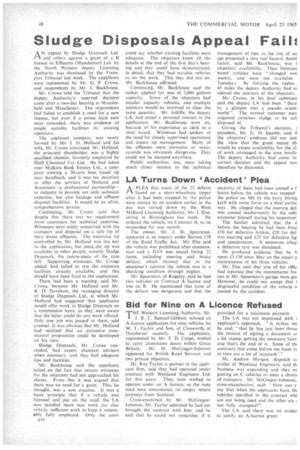Sludge Disposals Appeal Faill
Page 50

If you've noticed an error in this article please click here to report it so we can fix it.
ANappeal by Sludge Disposals Ltd. and others against a •grant of a B licence to Effluents (Manchester) Ltd. by the North Western deputy Licensing Authority was dismissed by the Transport Tribunal last week. The appellants were represented by Mr. G. P. Crowe, and respondents by Mr, J. Backhouse.
Mr. Crowe told the Tribunal that the deputy Authority's reserved decision came after a two-day hearing at Macclesfield and Manchester. The respondents had failed to establish a' need for a new licence, but even if a prima facie case were conceded, there was evidence of ample suitable facilities by existing Operators.
The applicant company was newly formed by Mr. I. D. Holland and his wife, Mr. Crowe continued. Mr. Holland, the principal shareholder, was a highly qualified chemist, formerly employed by Shell Chemical Co. Ltd. He had taken over Malkins Bank Estates Ltd,. a company owning a 50-acre lime based tip near Sandbach, and it was his intention to offer the services of Holland and Associates—a professional partnership— to industry to provide not only technical expertise, but also haulage and effluent disposal facilities. it would be an all-in, comprehensive service.
Continuing, Mr, Crowe said that despite this there was no requirement from customers for technical expertise. Witnesses were solely concerned with the transport and disposal on a safe tip of their waste effluents. The extensive tip controlled by Mr. Holland was the key to the application, but since the tip was available to other people, notably Sludge Disposals, the centre-piece of the case fell. Supporting witnesses, Mr. Crovo added, had failed to test the extensive facilities already available, and this should have been fatal to the application.
There had been a meeting, said Mr. Crowe, between Mr. Holland and Mr. R. D. Davidson, the managing director of Sludge Disposals Ltd., at which Mr. Holland had suggested that applicants would offer work to Sludge Disposals on a commission basis, so they were aware that the latter could do any work offered. Only one job was passed to them, said counsel. It was obvious that Mr. Holland had realized that an attractive commercial proposition could be developed on 'his own.
Sludge Disposals, Mr. Crowe concluded, had expert chemical advisers when necessary, and they had adequate tips and facilities
Mr. Backhouse said the appellants relied on the fact that certain witnesses for the objectors had not approached his clients. From this it was argued that there was no need for a grant. This, he thought, was a non sequitur. It was a basic principle that if a vehicle was licensed and put on the road, the LA was satisfied there was work for that vehicle, sufficient work to keep it reasonably fully employed. Only the users Ri 6
could say whether existing facilities were adequate. The objectors knew all the details at the end of the first day's hearing and they could have demonstrated, in detail, that they had suitable vehicles to do the work. This they did not do. Mr. Backhouse affirmed.
Continuing, Mr. Backhouse said the tanker applied for was Of 3,000 gallons capacity. Some of the objectors had smaller capacity vehicles, and multiple journeys would he involved to clear the same quantity, Mr. Jolliffe, the deputy LA, had stated a personal interest in the application, Mr. Backhouse went on, because of his experience as clerk to a river board. Witnesses had spoken of the need for closely supervised operations and expert tip management. Many of the effluents were corrosive or toxic; cyanide was obviously dangerous. They could not be dumped anywhere.
Public authorities, too, were taking much closer interest in the technical management of tips, as the risk of set age presented a very real hazard. Anotl factor, said Mr. Backhouse, was 1 objectors' availability. Their Newcast based vehicles were "changed ove weekly, and were not available Tuesdays. By limiting the radius 45 miles the deputy Authority had cc siderecl the interests of the objectors.
Mr. Crowe, in his final submissii said the deputy LA had been "dazzl by a glimpse into a pseudo scient world ". The normal customer men required common sludge to be safi disposed of.
Giving the Tribunal's decision, 1 president, Mr. G. D. Squibb, said ti the objectors' evidence did not just the view that the grant meant tho would be excess availability for the cl, of work envisaged in the area involyi The deputy Authority had come to correct decision and the appeal wet therefore be dismissed.




































































































































